
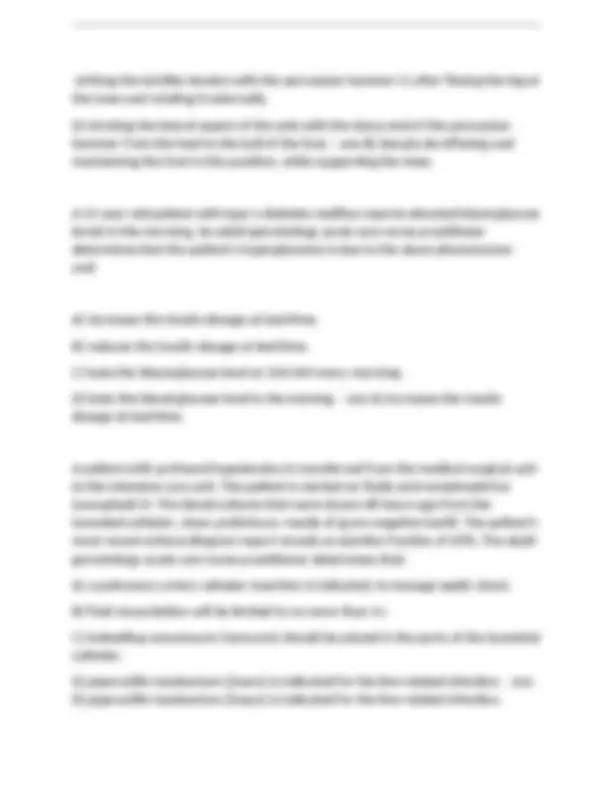
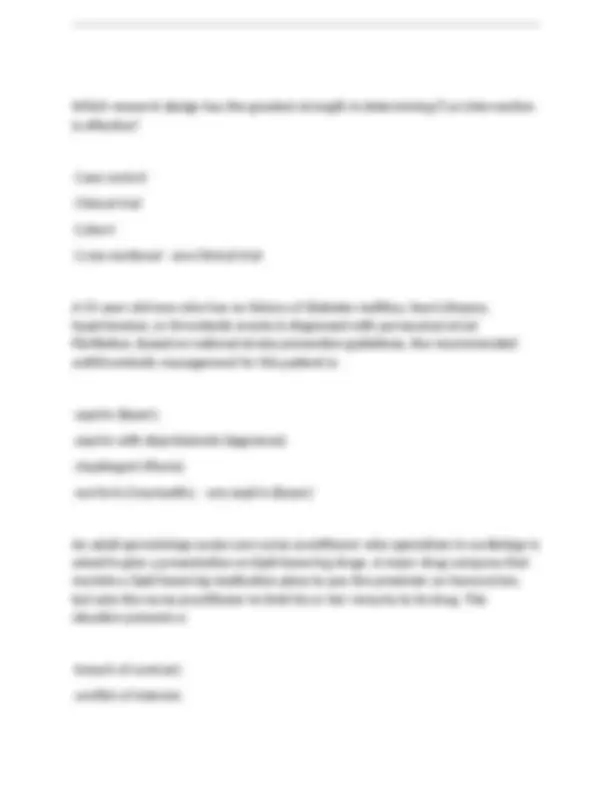
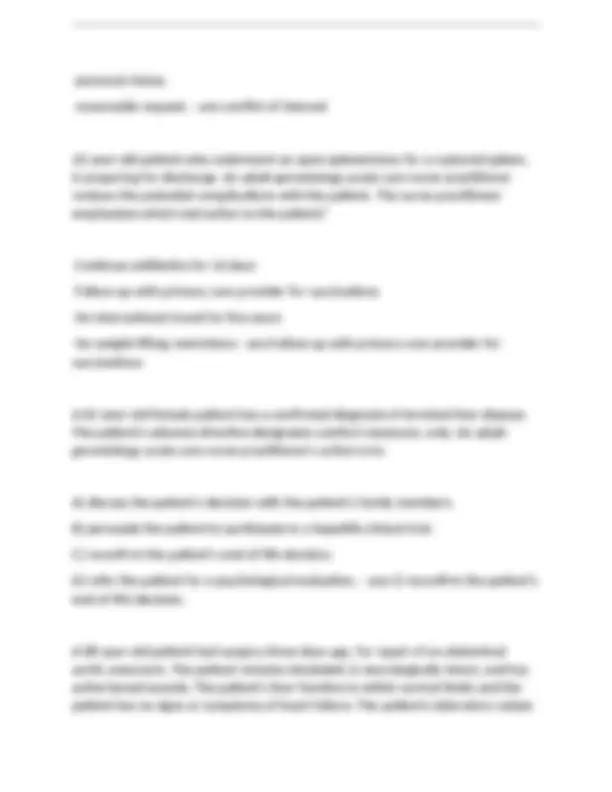
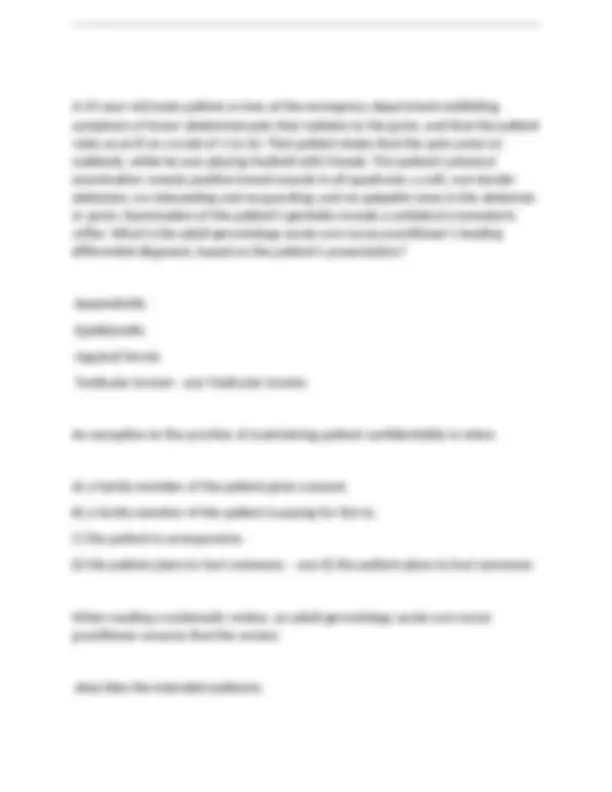
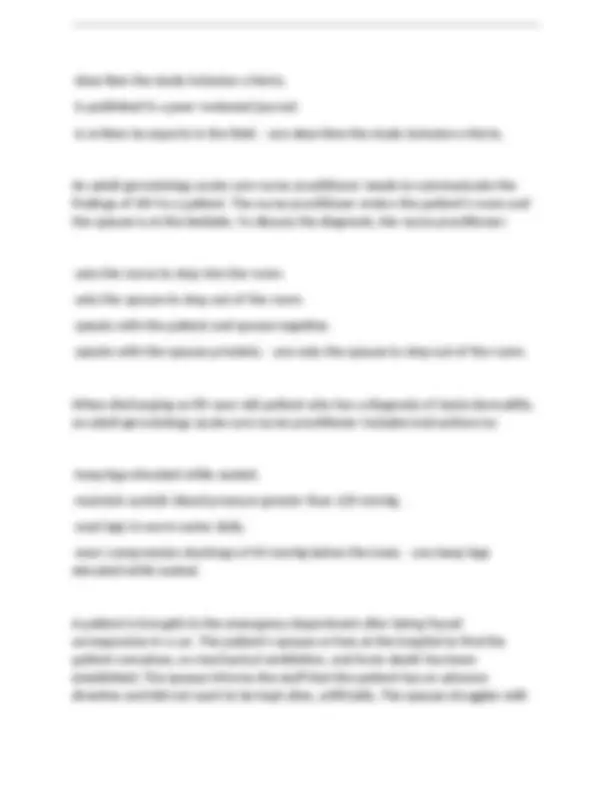
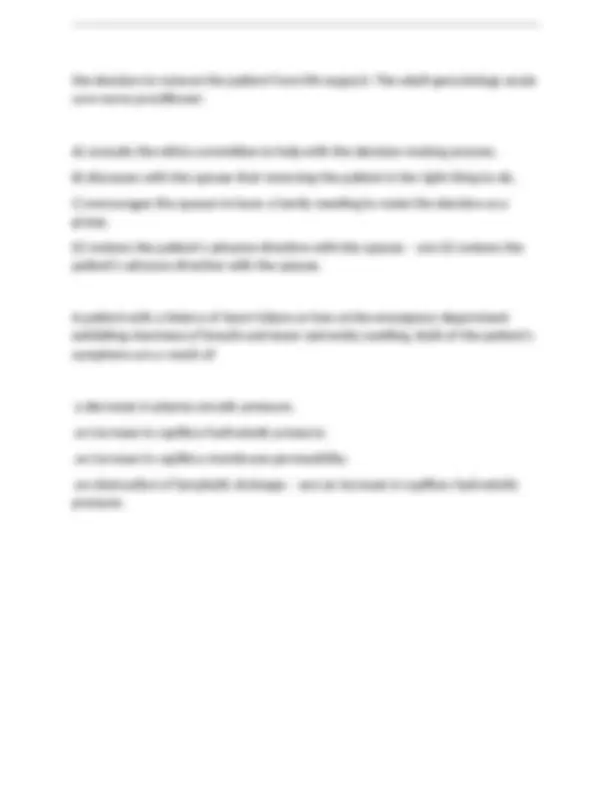


Study with the several resources on Docsity

Earn points by helping other students or get them with a premium plan


Prepare for your exams
Study with the several resources on Docsity

Earn points to download
Earn points by helping other students or get them with a premium plan
Community
Ask the community for help and clear up your study doubts
Discover the best universities in your country according to Docsity users
Free resources
Download our free guides on studying techniques, anxiety management strategies, and thesis advice from Docsity tutors
ANCC 2024 Sample Questions + correct answers graded +.docx
Typology: Exams
1 / 10

This page cannot be seen from the preview
Don't miss anything!







An older adult patient complains of recent lapses in memory and decreased alertness. The patient's laboratory test results indicate a mild, macrocytic anemia. Which additional test does the adult-gerontology acute care nurse practitioner order to confirm a diagnosis? A reticulocyte count A serum folate level An erythrocyte sedimentation rate Iron studies - ans-A serum folate level
To get more questions with correct answers email jamesdickson3161@gmail.com
Which research design has the greatest strength in determining if an intervention is effective? Case control Clinical trial Cohort Cross-sectional - ans-Clinical trial A 55-year-old man who has no history of diabetes mellitus, heart disease, hypertension, or thrombotic events is diagnosed with paroxysmal atrial fibrillation. Based on national stroke prevention guidelines, the recommended antithrombotic management for this patient is: aspirin (Bayer). aspirin with dipyridamole (Aggrenox). clopidogrel (Plavix). warfarin (Coumadin). - ans-aspirin (Bayer) An adult-gerontology acute care nurse practitioner who specializes in cardiology is asked to give a presentation on lipid-lowering drugs. A major drug company that markets a lipid-lowering medication plans to pay the presenter an honorarium, but asks the nurse practitioner to limit his or her remarks to its drug. This situation presents a: breach of contract. conflict of interest.
personal choice. reasonable request. - ans-conflict of interest 32-year-old patient who underwent an open splenectomy for a ruptured spleen, is preparing for discharge. An adult-gerontology acute care nurse practitioner reviews the potential complications with the patient. The nurse practitioner emphasizes which instruction to the patient? Continue antibiotics for 14 days Follow up with primary care provider for vaccinations No international travel for five years No weight lifting restrictions - ans-Follow up with primary care provider for vaccinations A 65-year-old female patient has a confirmed diagnosis of terminal liver disease. The patient's advance directive designates comfort measures, only. An adult- gerontology acute care nurse practitioner's action is to: A) discuss the patient's decision with the patient's family members. B) persuade the patient to participate in a hepatitis clinical trial. C) reconfirm the patient's end-of-life decision. D) refer the patient for a psychological evaluation. - ans-C) reconfirm the patient's end-of-life decision. A 68-year-old patient had surgery three days ago, for repair of an abdominal aortic aneurysm. The patient remains intubated, is neurologically intact, and has active bowel sounds. The patient's liver function is within normal limits and the patient has no signs or symptoms of heart failure. The patient's laboratory values
A patient with a history of atrial fibrillation, who has maintained normal sinus rhythm with sotalol (Betapace) is hospitalized for acute pyelonephritis. The appropriate antibiotic regimen for this patient is parenteral:A patient with a history of atrial fibrillation, who has maintained normal sinus rhythm with sotalol (Betapace) is hospitalized for acute pyelonephritis. The appropriate antibiotic regimen for this patient is parenteral: cefoxitin (Mefoxin). ceftriaxone (Rocephin). ciprofloxacin (Proquin). levofloxacin (Levaquin). - ans-ceftriaxone (Rocephin). Generally healthy patients, who are diagnosed with acute bronchitis, inappropriately ask for which category of drugs? Antibiotics Beta-agonists Corticosteroids Xanthines - ans-Antibiotics What legislation allowed nurse practitioners to be recognized Medicare providers in all geographical areas with their own provider number? The Affordable Care Act The Balanced Budget Act The Civilian Health and Medical Program of the Uniformed Services The Omnibus Budget and Reconciliation Act - ans-The Balanced Budget Act
A 19-year-old male patient arrives at the emergency department exhibiting symptoms of lower abdominal pain that radiates to the groin, and that the patient rates as an 8 on a scale of 1 to 10. That patient states that the pain came on suddenly, while he was playing football with friends. The patient's physical examination reveals positive bowel sounds in all quadrants; a soft, non-tender abdomen; no rebounding and no guarding; and no palpable mass in the abdomen or groin. Examination of the patient's genitalia reveals a unilateral cremasteric reflex. What is the adult-gerontology acute care nurse practitioner's leading differential diagnosis, based on the patient's presentation? Appendicitis Epididymitis Inguinal hernia Testicular torsion - ans-Testicular torsion An exception to the practice of maintaining patient confidentiality is when: A) a family member of the patient gives consent. B) a family member of the patient is paying for the tx. C) the patient is unresponsive. D) the patient plans to hurt someone. - ans-D) the patient plans to hurt someone. When reading a systematic review, an adult-gerontology acute care nurse practitioner ensures that the review: describes the intended audience.
the decision to remove the patient from life support. The adult-gerontology acute care nurse practitioner: A) consults the ethics committee to help with the decision-making process. B) discusses with the spouse that removing the patient is the right thing to do. C) encourages the spouse to have a family meeting to make the decision as a group. D) reviews the patient's advance directive with the spouse. - ans-D) reviews the patient's advance directive with the spouse. A patient with a history of heart failure arrives at the emergency department exhibiting shortness of breath and lower extremity swelling. Both of the patient's symptoms are a result of: a decrease in plasma oncotic pressure. an increase in capillary hydrostatic pressure. an increase in capillary membrane permeability. an obstruction of lymphatic drainage. - ans-an increase in capillary hydrostatic pressure.